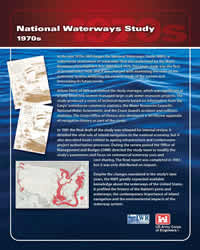
In the late 1970s, IWR began the National Waterways Study (NWS), a nationwide assessment of waterways that was authorized by the Water Resources Development Act (WRDA) of 1976. This large study was the first of its kind since 1908, and it was charged with examining the state of the waterway system, analyzing the current needs of the system and forecasting its future needs.
Arlene Dietz of IWR was named the study manager, which was significant at a time when few women managed large-scale water resources projects. The study produced a series of technical reports based on information from the Corps’ waterborne commerce statistics, the Water Resources Council’s National Water Assessment, and the Coast Guard’s accident and collision statistics. The Corps Office of History also developed a 10-volume appendix of navigation history as part of the study.
In 1981 the final draft of the study was released for internal review. It detailed the vital role of inland navigation to the national economy, but it also described issues related to ageing infrastructure and cumbersome project authorization processes. During the review period the Office of Management and Budget (OMB) directed the study team to modify the study’s parameters and focus on commercial waterway uses and cost-sharing. The final report was completed in 1983, but it was only distributed on request.
Despite the changes mandated in the study’s later years, the NWS greatly expanded available knowledge about the waterways of the United States. It profiled the history of the Nation’s ports and waterways, the contemporary importance of inland navigation and the environmental impacts of the waterway system.